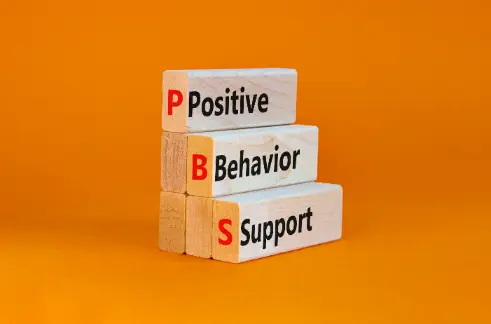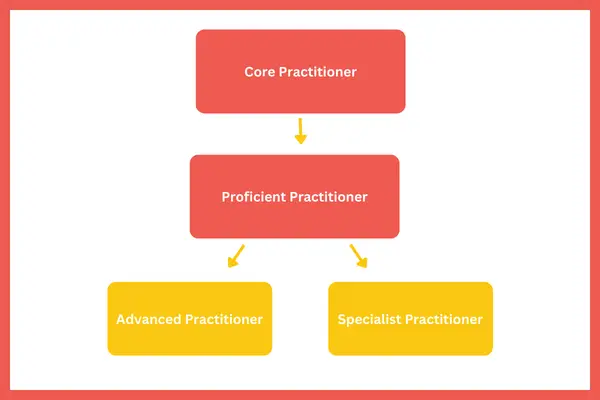What is Positive Behaviour Support? PBS is a framework of behavioural
analysis. Lear about the 7 Principles of the PBS Capability Framework. Find
out which of the 4 types of Support Practitioners are best for your loved
one.
Positive behaviour support is a framework of behavioural analysis that is centred around one individual participant. This framework aims to provide a long-term support strategy for people with a learning disability, autism, mental health conditions and/or other challenging behaviour so they can better manage their daily tasks and interactions.

The Positive Behaviour Support (PBS) Capability Framework
The NDIS positive behaviour support capability framework exists to establish regulated expectations and best practices to support participants. Within the framework, there is a definitive set of principles and values that create the foundations of successful positive behaviour support, and underpin the pathway for the progression of practitioner capabilities. These principles and values have been created with evidence-based practice and the UN Convention on the Rights of Persons with Disabilities (CRPB, 2006) in mind.
Key elements of the PBS Capability Framework
There are 7 principles of positive behaviour support that make up the PBS Capability Framework.
1. Interim response
An interim response is usually the first step in supporting behavioural management strategies. It is here where practitioners will identify high-risk behaviours and develop a response plan to safely manage these behaviours using the least restrictive methods.
2. Functional assessment
This is a systematic assessment of when, where, how and why an individual may display behaviour that is considered challenging. The outcome of this process is to develop a clear description of their challenging behaviours and to be able to successfully predict when these behaviours will occur across a typical day for this participant. This will be the foundation for developing strategies to support positive behaviour.
3. Planning
Here the practitioners will develop a positive behaviour support plan to map out the strategies that will increase the participant’s quality of life. These behaviour support strategies will focus on the participant’s strengths so they can increase their life skills and reduce the frequency and intensity of undesirable behaviour.
4. Implementation
The participant will implement the positive behaviour strategies into their day-to-day life, hopefully minimising the patterns of dysregulated behaviour. Practitioners will use data to monitor the implementation of the behavioural support plan.
5. Know it works
Through regular engagement with the participant, and monitoring of data, the practitioner will evaluate the participant’s progress and make any necessary modifications to the plan.
6. Reduce and eliminate restrictive practice
If the participant has responded well to their behaviour support plan, any restrictive practices that were put into place may now be reduced or eliminated.
7. Continual professional development & supervision
In order to have the most skilled and experienced practitioners, the positive behaviour support capability framework requires all practitioners to reflect on their experience as a support provider, map out developmental goals and undergo supervision.
Who can give positive behaviour support?
Positive behaviour support can only be given by providers who are registered with the NDIS Commission. This is to help regulate the support providers and ensure that all practitioners have been checked and approved.
4 Types of Positive Behaviour Support Practitioner
There are four levels of positive behaviour support practitioners who all provide various degrees of support and behaviour support techniques to the participants.

1. Core
A practitioner who is considered to be ‘core’ is an entry-level practitioner. Core practitioners are expected to be able to recall, understand and apply behaviour support strategies relating to disability and positive behaviour support in general circumstances.
Core practitioners also need to have an understanding of other models that can compliment positive behaviour support such as environmental enrichment and participant-centred active support.
Practitioners at this level are required to work under the supervision of a practitioner who is rated proficient or above.
2. Proficient
Proficient practitioners are required to meet the core capabilities as well as be able to successfully analyse and evaluate information, evaluate the quality and suitability of support plans, promote PBS across the organisation, access and actively participate in supervision from a higher level practitioner, provide and participate in peer supervision and supervise a core practitioner if they have the skill to do so.
3. Advanced
Advanced practitioners have advanced skills across every level of the PBS Capability Framework. On top of their already developed skills, they are also expected to:
-
Integrate information from a variety of sources
-
Demonstrate high-level critical thinking and apply analytical skills for effective decision-making in complex situations
-
Have a high level of skills and understanding in all areas of the PBS capability framework, as well as in concepts that complement PBS delivery
-
Apply strategic thinking to create behaviour support strategies
-
Achieve systematic change to enhance the rights of a person with a disability
-
Demonstrate leadership across settings and interactions with stakeholders
-
Apply knowledge and practical skills to provide specialist behaviour support in complex contexts
-
Engage in peer supervision with another advanced practitioner as well as supervising practitioners at all levels
-
Demonstrate managerial and leadership skills
4. Specialist
Specialist practitioners are recognised for an area of specialisation and expertise in PBS, in addition to a level of proficiency. Specialisation areas include but are not limited to:
-
Practice specialist (for example: forensic, trauma-informed practice, augmentative and alternative communication)
-
Dual diagnosis (intellectual disability and mental health)
-
A focus on a specific cultural group, age group or transition point
In addition to their areas of specialisation, a specialist practitioner also requires the following competencies:
-
Demonstrate and apply skills to provide supervision and support to other practitioners within their area of specialisation
-
Participate in peer supervision or supervise practitioners of other levels
How can we help?
Scarlet Homecare’s practitioners are committed to helping you find the right pathway to reduce and prevent challenging behaviour, so you can get the most out of your everyday life.
Our practitioners utilise the NDIS positive behaviour support framework to deliver care personalised to you and your individual needs. For more information on how we can begin working with you, please give us a call on 08 8120 4069 or complete our online form.




